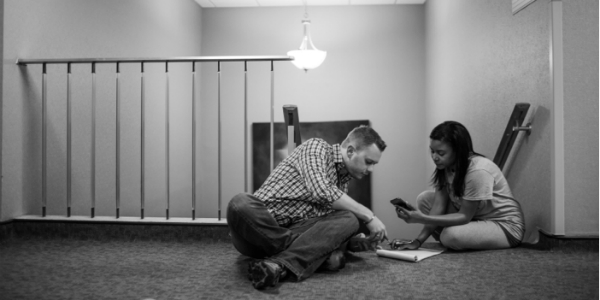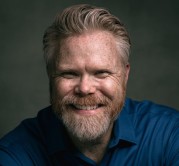You shouldn’t be a CUDE

The feeling started with the flags.
They’re hanging all around the training room, shimmering rectangles of silk, some bold, some restrained, all of them mute sentinels covering every square inch of the walls, impossible to ignore, symbolic of something far bigger than the people over whom they fly. I knew, then and there, I was on the edge of something I’d never forget.
It was mid-September 2014 and I’d just arrived in Madison, Wisconsin to serve as the embedded photographer and videographer for the Credit Union Development Educators (CUDE) Training offered by the National Credit Union Foundation (NCUF).
I would spend dozens of hours hunched near those flags, which represented the 34 countries from whom more than 1,100 CUDEs have risen since 1982, and around these 44 attendees to quietly document what goes on during the most famous credit union training you know nothing about.
It would take a few more hours, shutter clicks, and guest speakers to properly name the feeling. When I did, though, I had to put my camera down to process it fully:
You shouldn’t be a CUDE. Why?
It’s hard work
CUDE is a tough seven-day training program. Emphasis on WORK. Every day’s agenda is busting at the seams with facilitated discussions, small group work, field trips, networking, simulations, brainstorming exercises, mystery shops, and detailed application plans for when the DEs return to their CUs.
And that doesn’t count the day before graduation.
That’s when each group is given a complex issue facing credit unions around the world in mid-afternoon. They have until 8am the next morning to create a realistic action plan for solving it. That includes poring over hundreds of pages of data and research they’ve never seen before, developing a formal presentation they’ll deliver the next day to their classmates and interested dignitaries visiting from CUNA, CUNA Mutual, NCUF, the World Council of Credit Unions, or Filene Research Institute. While many groups shape their complex solution by midnight, others may work until the smallest hours of the morning.
It squashes your ego
That fancy title on your business card? You leave it at the door at CUDE training. Literally. No participant mentions their exact job title at their credit union. Your square on the org chart is irrelevant. Everyone is put on the same level, connected by their love for credit unions. Speaking of which…
It loves credit unions more than you do
If you don’t love credit unions – not “like”, not “have a passing affinity for”, not “this CU thing will do until something better comes along”- don’t come anywhere near CUDE. These folks not only drink the CU Kool-Aid, they make it fresh, by the gallon, every day, and use it as body wash.
They care about our heritage, our call to social responsibility, our future, our global impact. They use the term “movement”without hesitation or apology, having consigned our age-old “We’re a movement!/No we’re not!”knife fight to its rightful place in the rubbish heap.
The professionals I had the privilege to frame in my camera’s viewfinder will move thousands, if not millions, of credit union members before their careers are said and done. Whether you like it or not. Whether you’re ready or not.
It blows up your world
For all the hue and cry about industry contraction, regulatory burden, taxation, competition, and RBC, we North American credit union types have it pretty good. We’re making money and having fun, as my old CFO used to say.
We can afford to debate the fine points of regulatory relief and the latest lobbying efforts from the comfort of air-conditioned offices before driving a well-maintained company car to a conference or chapter meeting or vendor-sponsored golf outing while we pay for dinner on our corporate credit card and conduct business on our credit union-owned smartphone.
Most of us don’t know how poverty steals hope and perspective and discipline as surely as it robs its victims of food and security. Most of us don’t know what its like to run our corner of the CU world in the absence of trivial details like electricity, computers, or running water.
But the working poor are all around us, desperate for us to live the difference we devote so many pixels and print to promote. Our 100 million US CU memberships don’t account for even half of the world’s total CU members that put their trust in one of 57,000 credit unions in 103 countries on 6 continents, many of whom would trade their vault to have the branch location you can’t wait to remodel.
But CUDEs are not like most of us. Over the course of their training they see, in graphic and heart-wrenching detail, exactly how these and many more issues challenge the very existence of credit unions around the world and the members who make them possible. It puts a face on those we try to ignore while suggesting practical ways to help those we’re brave enough to finally see.
By the time you read this, these newly-certified CUDEs will have returned to their desks in various countries around the world, their experiences frozen forever in time, a certain flag-draped room in Madison far behind them.
But I can assure you: right now they’re looking for the next frontier, the next opportunity to make a member’s financial dreams come true. They’re running headlong into that new world, ready to plant their own flag into that new ground and asking each of us to follow them, listen to them, learn from them. They do so not for money or acclaim but for the great joy of serving others – to leave a legacy that will outlive them all.
On second thought, you should be a CUDE.
We all should.









